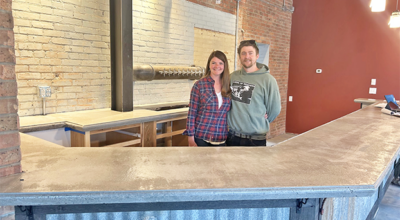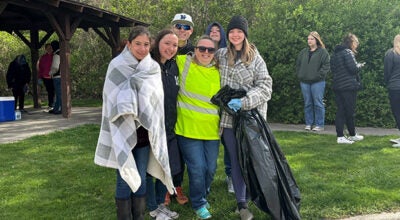Cass County collects 45 tons of waste
Published 10:19 pm Thursday, April 7, 2011

Michigan State University Extension educator Dan Rajzer. (The Daily News/John Eby)
Since 1999, Cass County’s household hazardous waste, household electronic waste and used tire collection has redirected 90,515 pounds of products — 45 tons — deposited by 883 participants.
While the two biggest totals were 17,500 pounds the second year in 2000 and 11,765 pounds the third year in 2001, those years there were two collections, one in spring and one in fall.
There was no collection in 2006.
Dan Rajzer, Michigan State University Extension educator, spoke to Dowagiac Rotary Club Thursday noon at Elks Lodge 889 as the guest of Cass County Commissioner Robert Wagel.
“On average,” Rajzer said, “we collect 2 1/2 to three tons of products each year. I’d like to see more. We have 70 to 90 participants each year. I’d like to see that up around 120 to 150. I believe there are more products out there to properly dispose of. Oil-based paints made up 31 to 32 percent of our volume. That hasn’t really changed a lot, except to go up a little bit.
“The big thing is automotive liquids,” he continued. “This is primarily used motor oil and antifreeze. That was at 39.6 percent, so we did an educational program over the next couple of years” highlighting other ways to dispose of used motor oil, such as recycling or businesses that burn it as a heating source. “Through that effort, we were able to drop that down to only 11.3 percent of the volume in 2010. Household pesticides actually increased from 4.5 to 10.9 percent.”
On average, a participant brings 103 pounds.
A total of 2,781 tires has been collected.
The Board of Commissioners co-sponsors the effort with MSU Extension and has spent $90,420 since 1999 providing the service.
Cass County’s household hazardous waste, household electronic waste and used tire collection takes place Saturday, May 21, from 9 a.m. to noon, at the fairgrounds, 590 O’Keefe St.
“We use under the grandstand because it’s all enclosed,” Rajzer said, so the semi from Drug and Lab Disposal (DLD) in Plainwell can park without being exposed to rain.
Then the grandstand becomes a drive-through, with vehicles streaming in through one overhead door, parking long enough to unload products and leaving by the other side.
DLD sets up a plastic-lined “sorting table. They have to have a chemist on site so products don’t get mixed together that could accidentally explode on the way back to their facility,” Rajzer said.
Pre-registration helps disperse traffic flow and avoid “slugs of vehicles coming in all at one time,” he said.
Besides financial support, several commissioners, including Carl Higley, Charlie Arnold and Bob Ziliak, come to the fairgrounds and help out on disposal day.
Silver Creek Township Clerk Walt Lehmann has also been a repeat volunteer.
Products are sorted into plastic barrels and packed with an absorbent material.
Barrels are sealed and labeled.
“When we first started this program in 1999,” Rajzer related, “we had people bring in trailerloads of 55-gallon barrels. We’re doing decent on tire collections, though not as many as we’d like to see. A 40-foot semi can hold 1,100 to 1,200 tires.”
To participate, complete a registration form and return it to MSU Extension, 120 N. Broadway, Suite 209, Cassopolis, MI 49031.
To avoid congestion and minimize safety issues, they will then contact you with a scheduled appointment time after the registration form is received.
A second page with the form lists acceptable and unacceptable products and associated fees.
There is no charge for up to 300 pounds of household hazardous waste.
Acceptable items include: from your home, aerosols, dry-cell batteries, bug sprays, chlorine beach, dyes, floor care products, floor wax, furniture polish, mercury batteries, oven cleaners, scouring powders, spot and stain removers, spray dust cleaners, upholstery cleaners, carpet cleaners, moth balls and flakes, ammonia, lamp oil and drain cleaners; from your workshop, alcohols, creosote, cutting oil, adhesives and cements, mineral spirits, naptha, paint brush cleaners, polyurethane coatings, rust remover, wood stain, wood preservatives, oil-based paint, artist’s paints, model paints, strippers, thinners, muriatic acid, sulfuric acid and varnishes; from your garage, anti-freeze, brake fluid, car wax, rubbing compounds, metal polishes, diesel fuel, gasoline, two-cycle gas mixes, engine cleaners, starting fluid, gas/diesel additives, kerosene, degreasers, transmission fluid, fiberglass epoxy and radiator flushes; from your garden, algaecides, ant and roach powder, bug sprays, fertilizer, fly strips, fungicides, garden dusts and sprays, insecticides, rat and rodent poison and weed killer; and miscellaneous, mercury, dry cleaning solvents, gun cleaning solvents, lighter fluid, hobby chemistry sets, photographic chemicals, swimming pool chlorine, hot tub chemicals, disposable propane cylinders and white gas.
Items NOT accepted are used motor oil, latex paint, car batteries, fire extinguishers, smoke detectors, ammunition, fireworks, bio-hazards and propane tanks.
Electronic waste consists of anything plugged in or that operates with a battery.
However, duhumidifiers or any major appliances will not be accepted.
Monitors and TVs have a handling charge of $5 each.
The tire fee schedule includes: cars and pickup trucks, $2 without rims, $4 with rims; semi trucks, $6 without rims, $8 with rims; and tractor, $20 without rims and $25 with rims.






